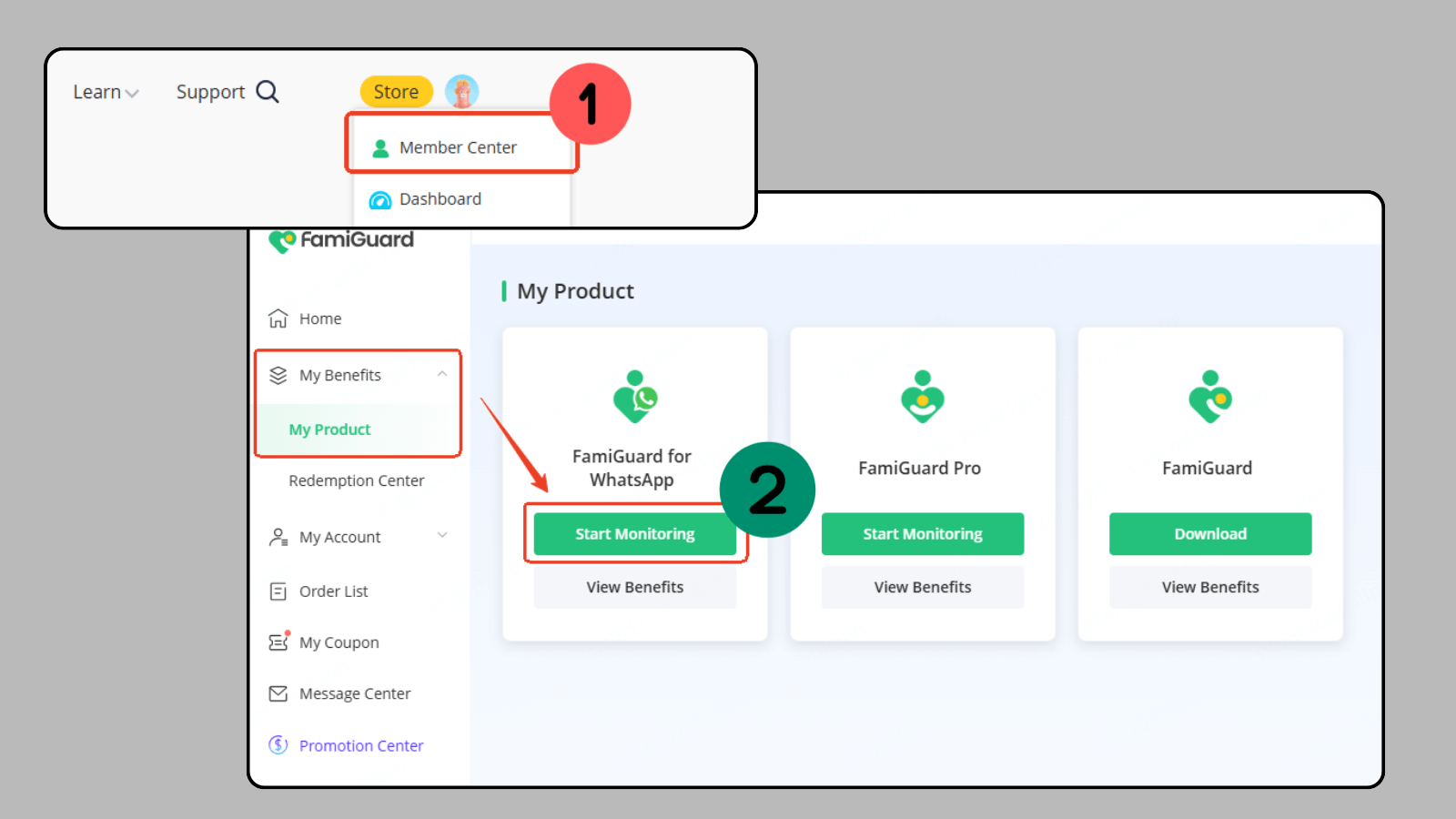WhatsApp, as a popular social media app among the young generation, its safety has become a growing concern for parents. WhatsApp sexting is getting more and more attention from parents since the risks of sharing explicit content have risen due to WhatsApp's increased popularity. So, similar questions like 'Is sexting allowed on WhatsApp?' and 'How to prevent kids from the dangers of sexting on WhatsApp?' have been asked.
In this article, we'll provide you with knowledge about WhatsApp sexting and methods of safeguarding children's online safety on WhatsApp in this digital world. By understanding WhatsApp slang words, safety measures, and the importance of open communication, you can ensure your child's online well-being better.

Table of Contents
Part 1: What Is WhatsApp Sexting and Its Risks
WhatsApp sexting involves sending sexually explicit messages, photos, or videos through the popular messaging app. This practice has become increasingly common among young people, especially teenagers. WhatsApp's secure and private nature and features like end-to-end encryption and disappearing messages make it an attractive platform for sexting. However, it's crucial to understand that once content is shared, you lose control, even if it's meant to disappear.
1. Why Do Teens Engage in WhatsApp Sexting?

There are several reasons why teens might sexting on WhatsApp:
- Curiosity about their changing bodies and emerging sexuality often plays a role. Some see it as a way to explore romantic relationships or flirt with potential partners.
- Peer pressure can also be a significant factor, as teens may feel compelled to participate to fit in or gain social acceptance.
- Additionally, some young people view sexting as a form of "safe sex" since it doesn't involve physical contact or the risk of pregnancy or STDs.
2. Potential Dangerous of Sexting on WhatsApp to Kids
While WhatsApp sexting might seem harmless or exciting at the moment, it can have serious consequences. Once an image or message is sent, it can be easily shared, saved, or screenshot, even on apps like WhatsApp that claim to offer privacy. This loss of control over personal content can lead to various issues:
1 Emotional distress
If private content is shared without consent, it can cause feelings of shame, embarrassment, and anxiety. This emotional toll can have a lasting impact on a person's mental health and self-esteem.
2 Reputational damage
Leaked sexts can spread quickly, potentially damaging a person's reputation among peers, family, and even future employers or educational institutions.
3 Legal consequences
In many jurisdictions, sexting involving minors is considered child pornography, even if the participants are underage themselves. This can result in serious legal trouble, including criminal charges and potential sex offender registration.
4 Cyberbullying and exploitation
Sexts can be used as ammunition for bullying or blackmail. Some individuals might use these images to manipulate or exploit the sender.
5 Long-term digital footprint
Even if an image is deleted, it may have already been saved or shared elsewhere. This digital footprint can resurface years later, causing unforeseen problems in personal and professional life.
6 Relationship issues
Sexting can strain relationships, leading to trust issues and communication breakdowns. It can also create uncomfortable situations if the relationship ends and one party still possesses intimate content of the other.
7 Vulnerability to predators
Engaging in sexting can make teens more susceptible to online predators who might exploit their naivety or use manipulative tactics to obtain more explicit content.

Both parents and teens can care about online behavior and protect themselves from potential harm associated with WhatsApp sexting.
Part 2: Warning Signs Your Child May Be Sexting on WhatsApp
As a parent, you might be worried about your child engaging in WhatsApp sexting. It's crucial to be aware of potential warning signs indicating your teen is involved in this risky behavior. While these signs don't necessarily mean your child is being harmed by WhatsApp sexting, they warrant your attention and may require further investigation.
1. Changes in behavior

You may notice shifts in your child's demeanor or habits that seem out of character. These changes could include:
- Increased irritability or anxiety, especially when using their phone
- Sudden obsession with their appearance or body image
- Withdrawal from family activities or conversations
- Neglecting responsibilities like schoolwork or chores
- Lying about their online activities or who they're talking to
It's important to note that some of these behaviors are common during adolescence. However, if you observe multiple signs or drastic changes, it might cause concern.
2. Increased secrecy with devices
One of the most telling signs of potential WhatsApp sexting is a sudden increase in secrecy surrounding your child's phone or other devices. You might notice:
- Your child quickly hiding their screen when you enter the room
- Reluctance to hand over their phone, even for routine checks
- Frequent use of password protection or changing passwords often
- Using their device in private spaces more often, like bathrooms or closets
- Deleting messages or clearing browser history regularly
While privacy is important for teens, excessive secrecy could indicate they're hiding something potentially harmful.
3. Unusual phone activity
Pay attention to changes in how your child uses their phone or other devices. Some red flags include:
- Receiving calls or messages at odd hours
- Sudden increase in data usage or text messages sent
- Using secret messaging apps you're unfamiliar with, especially those with encryption features
- Having multiple social media accounts or "secret" accounts you weren't aware of
- Unexplained charges on phone bills or requests for money to buy apps or credits
Maintaining open communication with your child about their online activities is essential. If you notice these warning signs, approach the issue calmly and without judgment. Remember that your goal is to protect your child and keep them safe in the digital world, including on platforms like WhatsApp, where sexting can occur.
Part 3: How Can Parents Protect Their Kids from WhatsApp Sexting?
To protect your child from the risks of WhatsApp sexting, you can try some effective monitoring strategies. But it is necessary to talk with kids first. The best method is let them understand the potential risk of WhatsApp sexting rather than you protect them from it every time. These approaches will help you keep an eye on your child's online activities while maintaining trust and open communication.
1. Have an Open Communication with Kids
The foundation of any successful monitoring strategy is open communication with your child. It would help if you started conversations about online safety and responsible messaging when your child uses WhatsApp or any other messaging app. Encourage your child to come to you with concerns or worries about sexting or other uncomfortable online interactions.
When discussing sexting on WhatsApp, it's essential to:
- Ask your child what they know about sexting and listen to their perspective.
- Explain the potential consequences of sexting, including legal and emotional risks.
- Discuss the illusion of privacy online and how easily images can be shared without consent.
- Create an environment where your child feels comfortable talking about anything, including sexting.
Remember, these conversations should be ongoing and age-appropriate as your child matures.
2. Use Parental Control Apps for WhatsApp
Parental control apps can be valuable tools to get insight into your child's WhatsApp activities. These apps offer various features to help you keep your child safe online. Among the parental control apps for WhatsApp in the market, FamiGuard for WhatsApp can be the best WhatsApp tracker that allows you to track your child's WhatsApp remotely and unselectively.
With FamiGuard for WhatsApp, you can check kids' WhatsApp messages to know if they are sent or received some inappropriate content in chats, including to determine if they are being harmed by WhatsApp sexting. Especially, this tool provides parents a feature to see and save all view once messages on WhatsApp directly, with which you can inspect more suspicious messages or even prepare for subsequent evidence collection.

FamiGuard for WhatsApp - Best Way to Check WhatsApp Messages
-
Check WhatsApp Messages: You can know your kid is chatting with whom by checking their messages on WhatsApp, including the deleted or withdrawn ones.
-
Save View Once Photos: You can directly see and save view once messages, including view once photos exchanged on WhatsApp, even if they are meant to disappear after view once.
-
Track Locations on WhatsApp: You can know the whereabouts of your kid on WhatsApp, whether the live location or shared locations on WhatsApp.
-
Keyword Alert: You can set some common slang used in sexting as keywords, like CU46, 53X, IWSN, etc., and you will get a notification when these acronyms are included in your kid's WhatsApp chats.
-
View WhatsApp Media: You can see all media files exchanged on WhatsApp, such as voices, photos, videos, and documents, so it's convenient to see these media at one time to check if there is inappropriate content on WhatsApp.
While sometimes parents only want to know about kids' WhatsApp activities, it is not convenient to purchase one parental control app service just for WhatsApp. Then, FamiGuard for WhatsApp will give you a hand, which is one wonderful WhatsApp monitoring app.
How to check kids' WhatsApp activities with FamiGuard for WhatsApp?
Step 1: Tap the Sign In/Up button below to get a FamiGuard account if you didn't have one before, and select a subscription plan suitable for you.

Step 2: Log in to FamiGuard website, click on your profile in the upper-right of the screen, enter the Member Center > My Benefits > My Product, find FamiGuard for WhatsApp on the page, and click Start Monitoring.

You'll enter a web control panel, click on the "Add A New Device" button, choose the device type fo the target device to be monitored, and there will be instructions of how to set up this app on different devices.

Follow the accordingly instructions to download this appon the individual's phone.

After installation finished, click Verify Setup to bind the individual's phone to your online FamiGuard account.

Step 3: After completing all the above steps, you will be brought to a web control panel and can monitor the messages on WhatsApp by clicking "Chats."

Other popular parental control apps for WhatsApp monitoring include:
- FamiGuard Pro: Monitors for inappropriate words and phrases with customizable term lists.
- Bark: Uses AI to scan messages and alert you to potential issues without showing you every conversation.
- mSpy: Allows full access to WhatsApp chats, including images and videos.
When choosing a parental control app, consider factors like ease of use, compatibility with your devices, and the level of monitoring you're comfortable with.
3. Adjust Privacy Settings on WhatsApp
Setting clear boundaries for WhatsApp use is critical to protecting your child from the risks of sexting. Here are some strategies you can implement:
1. Create a family WhatsApp group to model appropriate online behavior.
2. Set expectations for who your child can accept as contacts.
3. Discuss the appropriate types of messages, photos, and videos to share online.
4. Teach your child to use WhatsApp's privacy settings and safety features.
5. Encourage the use of two-step verification for added security.
6. Set specific social media boundaries, such as screen time limits and privacy settings.
It's vital to balance monitoring and respecting your child's privacy. Discuss WhatsApp monitoring apps with your child before installation to maintain trust and transparency.
With open communication, parental control apps, and clear boundaries, you can effectively monitor your child's WhatsApp activity and protect them from the risks of sexting. Remember, the goal is to guide your child toward responsible online behavior while keeping them safe in the digital world.
Part 4: Common Slang and Acronyms Used in WhatsApp Sexting
There are several slang terms and acronyms that are often used in sexting or inappropriate conversations on messaging platforms like WhatsApp. Parents should be aware of these to better understand the context of their children's online interactions.
1. Common Slang and Acronyms Used in Sexting:
- GNOC – Get Naked On Camera: Often used to ask someone to undress or share inappropriate images.
- NIFOC – Naked In Front Of Computer: A signal that someone is unclothed while chatting online.
- CU46 – See You For Sex: This is an invitation for a sexual encounter.
- 53X – Sex: A numerical code used as shorthand for "sex."
- IWSN – I Want Sex Now: A direct request for sexual interaction.
- GYPO – Get Your Pants Off: This phrase encourages someone to remove their clothing.
- POS – Parent Over Shoulder: Alerts the other person that a parent is nearby, often used to hide inappropriate content.
- LMIRL – Let's Meet In Real Life: A phrase indicating a desire to meet in person, which can be dangerous in the context of online predators.
- TDTM – Talk Dirty To Me: Encourages the other person to engage in sexually explicit conversations.
- F2F – Face to Face: Implies wanting to meet in person, which can often be related to more than just casual meetups.
- CU – See You: Often used to arrange meetings, which could be tied to inappropriate intentions depending on the context.
- FWB – Friends With Benefits: Refers to a casual sexual relationship without commitment.
- ASL – Age, Sex, Location: Commonly used by strangers in online chats to gather personal information, which can be a red flag for inappropriate behavior or grooming.
- 8 – Oral Sex: Sometimes used as shorthand in online chats.
- CD9 – Code 9 (Parent in the room): Similar to POS, this alerts others that a parent is near.
2. Why it's important to know these
These slang terms can easily go unnoticed by parents if they are unfamiliar with them. Sexting can have serious consequences for young people, such as emotional harm, exploitation, and the potential for explicit images or messages to be shared beyond the intended recipient. By staying aware of this language, parents can intervene early to prevent risky behavior or inappropriate conversations.
Top 100 Teen Slang Words: Stay Updated with Your Kids' Lingo!
Parents should maintain an open line of communication with their kids about internet safety and online behavior.
Part 5: Taking Action: What to Do If You Discover Sexting
Discovering that your child has been involved in WhatsApp sexting groups can be a shocking and distressing experience. However, you should remain calm and avoid overreacting. Your teen is in the process of discovering their sexuality, and while sexting is a severe situation, it doesn't make you a bad parent or your child a bad kid.
1. Stay calm, and don't overreact
Take a deep breath and give yourself time to process the information. Exploding with anger or immediately condemning your child will likely cause them to shut down, making it difficult to have an open and honest conversation about the situation. Instead, approach the issue with a clear head and a supportive attitude.
2. Have an honest conversation
Once you've collected yourself, sit with your teen for an honest conversation. Create a safe and non-judgmental environment where your child feels comfortable sharing information. Ask open-ended questions to understand the whole story, such as what led them to engage in sexting, what they hoped to achieve, and whether they felt pressured.
During this conversation:
- Listen actively without interrupting or criticizing.
- Acknowledge the psychological impacts of sexting, including potential humiliation and damage to self-image.
- Discuss the risks associated with WhatsApp sexting, including privacy concerns and the potential for images to be shared beyond the intended recipient.
- Explain the legal consequences of sexting, especially when it involves minors.
- Emphasize that your primary goal is to protect them and ensure their online safety.
Use this opportunity to educate your teen about healthy relationships, consent, and responsible online behavior. Remind them they have choices about what they do with their body and who they share it with.
3. Seek professional help if needed
If you're concerned about how WhatsApp sexting has affected your teen's well-being or if you're struggling to cope with the situation yourself, consider seeking professional help. A therapist or counselor specializing in adolescent issues can provide valuable support and guidance. Professional help can be beneficial in several ways:
- Helping your teen process their emotions and develop healthier coping mechanisms.
- Addressing any underlying issues that may have contributed to the sexting behavior.
- Providing strategies to rebuild trust and improve family communication.
- Offering guidance on how to navigate the digital world safely.
Seeking help is not a sign of failure but a step toward ensuring your child's emotional well-being and online safety.
In addition to these steps, take practical actions to address the immediate situation. If your child received explicit images, instruct them to delete them immediately to avoid potential legal issues. If pictures of your child were shared, contact the relevant platforms to request their removal and consider reporting the incident to the appropriate authorities if necessary.
By approaching the situation with empathy, open communication, and a focus on education rather than punishment, you can help your teen learn from this experience and make safer choices in the future. Your goal is to protect your child and guide them towards responsible online behavior, including safe practices on platforms like WhatsApp.
FAQs about WhatsApp Sexting
1. Is WhatsApp safe for sexting?
No, sexting on WhatsApp is to send sexually explicit texts, photos, or videos via WhatsApp, while WhatsApp does offer end-to-end encryption, which secures messages, and only the sender and receiver can view them. It's not recommended to send private pictures and other content on WhatsApp due to risks. So, always ensure that the encryption feature is activated to enhance security.
2. Can parental control apps monitor WhatsApp messages?
Yes, parental control apps like FamiGuard for WhatsApp can monitor WhatsApp messages, including texts, images, and videos. This allows parents to oversee their children's conversations and ensure nothing inappropriate is being shared.
3. Are my WhatsApp messages visible to my parents?
Yes, despite WhatsApp's end-to-end encryption, parental control apps can decrypt messages if the child's device is linked to the parent's through such an app. This means parents can read messages precisely as they appear.
4. How can I set photo privacy restrictions in WhatsApp?
To manage photo privacy settings on WhatsApp, open the app and tap the three dots in the top right corner, then go to Settings > Account > Privacy. Here, you can adjust who sees your profile photo, among other settings.
5. How can parents protect their kids from WhatsApp sexting?
Parents can protect their kids by having open conversations, setting parental controls, and educating them on the risks of sexting and online privacy. You can also use a parental control app like FamiGuard for WhatsApp, a dedicated tracker for WhatsApp to check children's WhatsApp activities to protect them from being harmed by WhatsApp sexting. With this tool, you can check your kids' WhatsApp messages, track WhatsApp locations, view status on WhatsApp even if hidden, directly view and save WhatsApp view once messages, etc.
6. What should I do if my private WhatsApp messages are leaked?
If your private messages are leaked, seek legal advice, report the incident to the platform, and be aware of any emotional support resources available.
Conclusion
The protection of children from the risks of WhatsApp sexting has a significant impact on their online safety and emotional well-being. These measures above, combined with FamiGuard for WhatsApp and setting clear boundaries, provide a solid foundation to guide children toward responsible online behavior.
Parents can help their children learn from these experiences by focusing on education rather than punishment and making safer choices in future online interactions. This approach protects teens from immediate risks and equips them with valuable skills to handle similar situations responsibly in the future.

By Tata Davis
professional in software and app technology, skilled in blogging on internet
Thank you for your feedback!

































